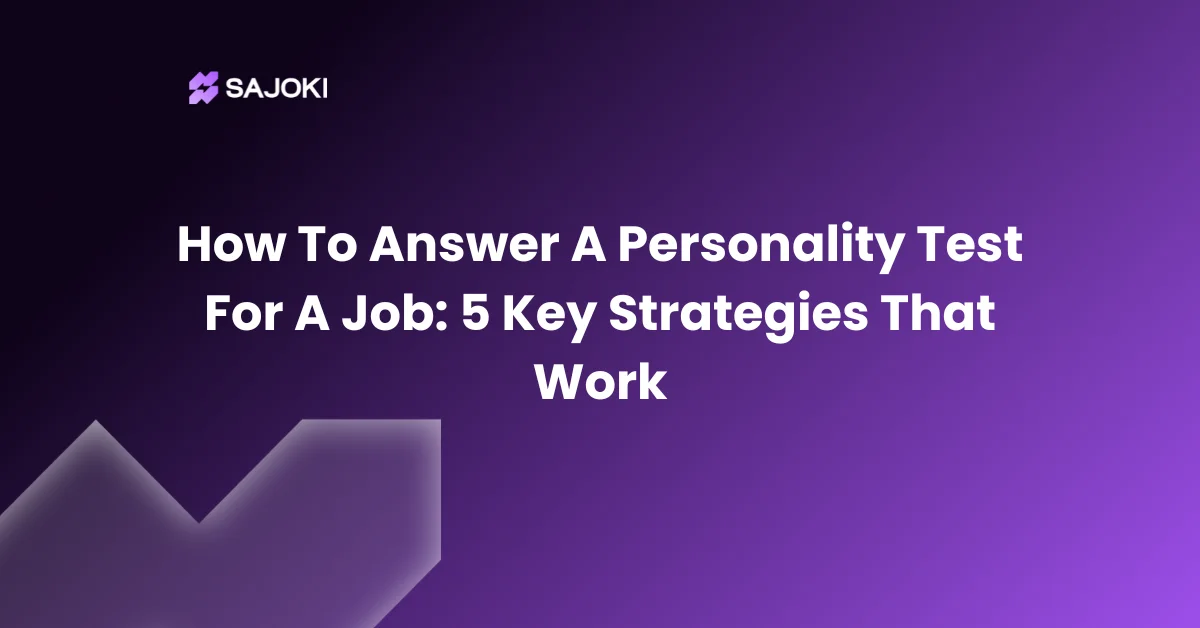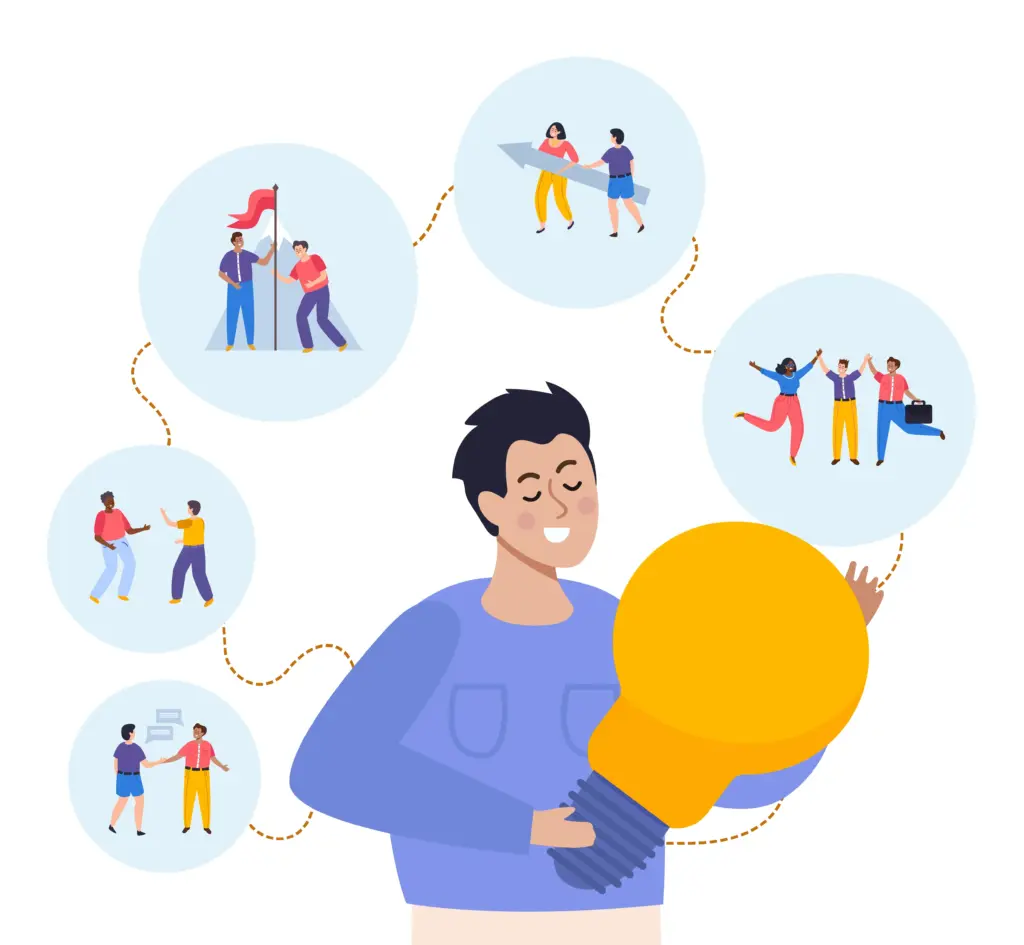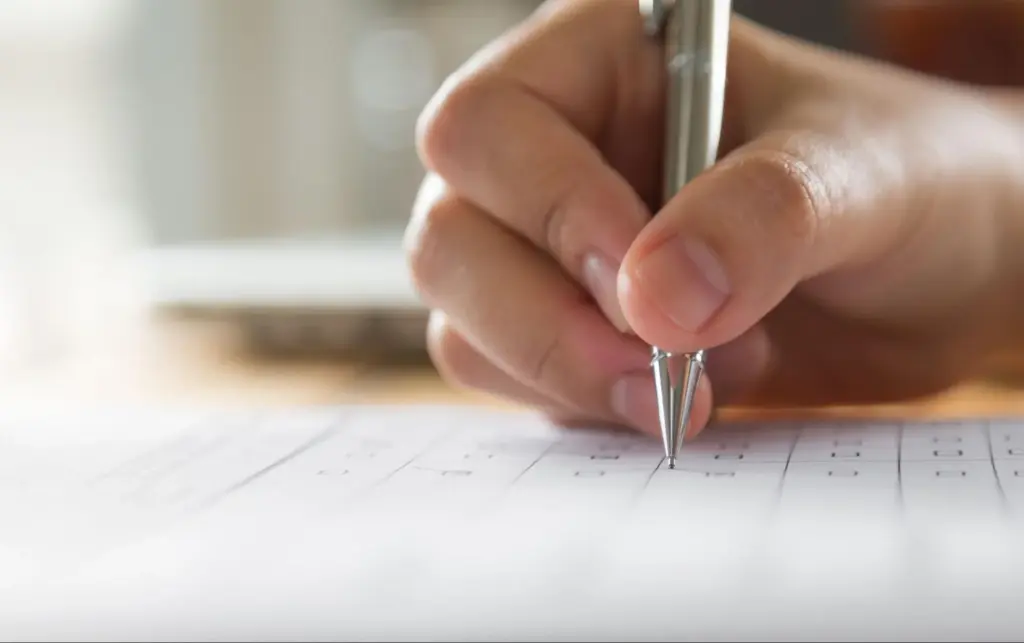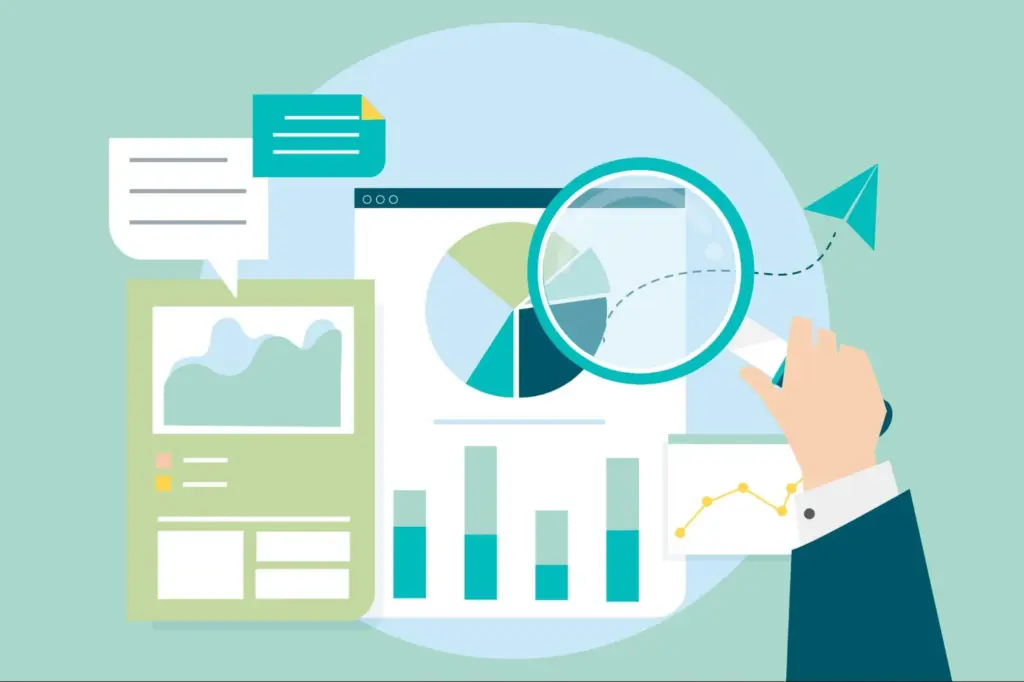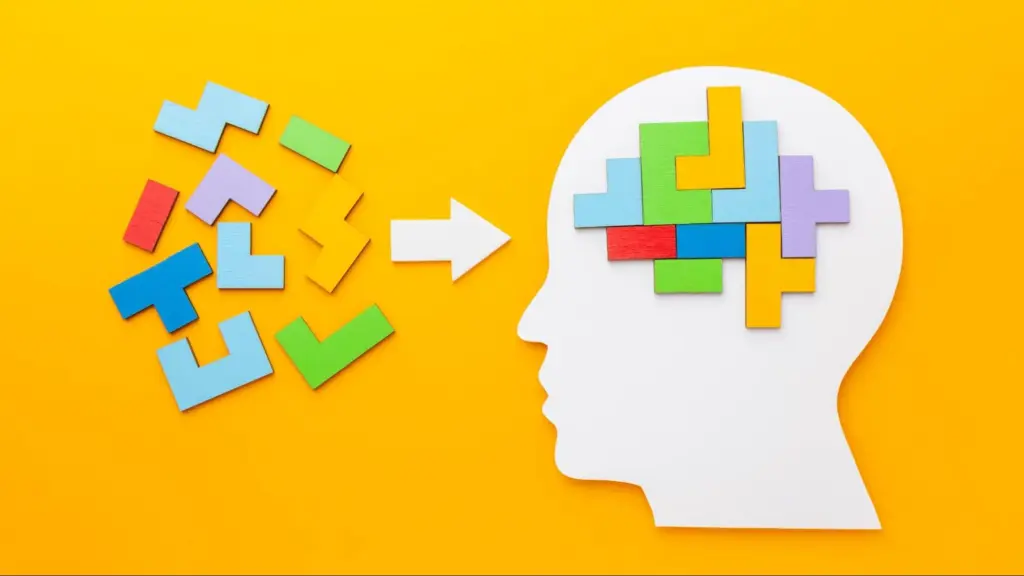If you’re looking for a job, you’ll likely encounter personality tests along the way. With time, companies use personality tests to screen candidates as it helps employers make data-driven hiring decisions rather than relying on instinct.
So, how to answer a personality test for a job?
Try to be honest but think professionally. Answer questions while considering the job role and company culture. Avoid extreme responses, stay consistent throughout the test, and focus on showcasing traits that match what the employer values.
In this article, we will explain step by step how to deal with personality tests. Also, the types of personality tests and the preparation process will be discussed. Finally, we will cover the most frequent mistakes to avoid. Let’s dive in!
Understanding Different Types of Personality Tests
Before being able to properly answer a personality test, you need to know what you are facing. Companies use several different personality tests. Each of them evaluates certain behaviors and traits.
Knowing the difference will allow you to tackle each test with the right approach. Here are the most widely used types of personality tests you need to be aware of;
1. The Big Five Personality Test
One well-used personality assessment by companies is the Big Five. It considers five basic qualities: openness, conscientiousness, extraversion, agreeableness, and neuroticism.
Statements like “I’m sociable and outgoing” might catch you, then you’ll have to demonstrate how much you agree on a scale.
The Big Five provides companies with an understanding of your working style. This addresses your handling of stress, your teamwork with others, and your approach to difficult circumstances.
Existing Relevant Content:
How To Score The Big Five Personality Test
Advantages And Disadvantages Of The Big Five Personality Test
2. Myers-Briggs Type Indicator (MBTI)
The MBTI allocates people to sixteen different personality types. The classification depends on their attention, information intake, decision-making, and change of approach.
The MBTI might ask if one prefers group work or solitary work, or if one favors detailed planning over adaptability.
Numerous firms utilize this for team composition and to understand individual communication preferences.
Furthermore, the success rate of the MBTI is quite high. This makes it one of the most reliable tests out there, used by popular test providers.
Existing Relevant Content:
Importance of MBTI Personality Test in Hiring
3. DISC Assessment
The four behavioral styles described in DISC are Dominance, Influence, Steadiness, and Conscientiousness. In most cases, you choose how you would respond to a given situation on a test with the DISC assessment.
For example, it will ask questions like What if your two close co-workers start to fight? What will you do in this situation? The situational questions are limitless, and you will be asked a lot of them with the DISC model.
Overall, businesses look at your answers to predict your response to pressure in the office and your relationships with other employees in the company.
Existing Relevant Content:
What Does DISC Personality Test Stand For?
4. Skill-Based Tests
Skill-based tests are quite common in technical fields such as software engineering or a developer role, where coding is essential. Well, in these types of tests, you can’t prepare yourself if you are not already prepared.
They are entirely focused on your skills rather than your personality. Thus, if you don’t know the answer, you don’t. You simply can’t adapt the answers like in personality tests.
5. Industry Specific Assessments
If it’s a niche industry you are applying to, expect to face customized assessments. Most niche industries make their own personality tests that are tailored to fit the niche and screen out candidates who will do best in this industry.
For example, in a customer service provider, expect assessments that will measure your patience and communication skills. On the other hand, sales-centric roles might have questions that measure competitiveness and resilience.
How to Answer a Personality Test for a Job: 5 Key Actions
Now that you are aware of the types of tests, we can finally dive deep into how to answer a personality test for a job.
These five important steps will enable you to deal with any personality assessment while keeping your authenticity.
1. Be Authentic But Professionally Minded
Attempting to be someone that they are not is the biggest error candidates make. There’s a difference between being professionally minded and being fake.
Think about your workplace persona. It’s the version of yourself that shows up to work every day.
For instance, you might be quiet in social situations, but when you have expertise to offer, you speak boldly in meetings.
Both are authentic parts of who you are.
Also, try to emphasize the professional sides of your personality that fit the job. If a question asks about handling conflict, consider how you have really handled workplace conflicts.
We know it’s very difficult to separate the ways you would handle family/friends conflicts from the workplace. However, it must be done to answer specifically how you would solve conflicts in the workplace environment only.
2. Think Like the Role You Want
There is a perfect personality type for every job role. Consider what kind of person would actually succeed in this role before responding to any questions.
They most likely want someone who is encouraging and patient if you’re applying to be a teacher. Are you applying for a sales position? They want someone who is resilient and competitive. It’s that easy.
However, this does not imply that you should pretend to be someone you are not or tell lies. Rather, consider the aspects of your true self that align with their needs.
3. Avoid Extreme Responses
Scales ranging from strongly agree to strongly disagree are used in most personality tests. Selecting the strongest responses may seem wise, but this usually backfires. Extreme reactions give the impression that you are stubborn or unreal.
Is it true that you never experience stress? Do you find every task enjoyable? Employers are aware that’s not sincere.
The majority of traits are on a spectrum, and employers favor applicants who are well-rounded. While having confidence is admirable, it sounds fake to say you never doubt yourself.
Choose agree or somewhat agree rather than strongly agree. This highlights your strengths and demonstrates your honesty about your limitations. Furthermore, it gives you a sincere and self-aware appearance.
4. Stay Consistent Throughout
Personality tests sometimes feature similar questions phrased differently in order to look for consistency. If you say early in the test that you are detail-oriented, be sure your later answers confirm this.
Contradictory responses point out you’re not being honest and create red flags. The safe way is to remember your key professional characteristics throughout the assessment.
If you have a reputation for working under pressure, avoid later indicating that you avoid difficult situations. This consistency helps create a clear picture of your professional self.
Go slowly with every question, but avoid obsessing about it. Your first instinct is usually most authentic. If you find yourself doubting many responses, you could be trying too hard to fool the system instead of really presenting yourself.
5. Handle Different Question Types Strategically
Various question types call for different strategies; let’s check them out.
- Situational Questions: Choose the answer that best captures your actual professional handling of the workplace scenario. Choose something reasonable for you rather than what seems “perfect”.
- Rating Scales: Do not rate according to your absolute best or worst days, but rather based on your normal work behavior.
- Forced-Choice Questions: Though you can do both well, choose the option that best reflects your natural workplace tendency
Always remember that personality tests have no generally “correct” responses. The aim is to fit you and the company just right.
Following these five fundamental points will help you show employers a real, professional version of yourself.
How do you Prepare Before Taking a Personality Test?
Proper preparation can be the key to a personality test boosting your application rather than harming it.
You can’t study for these tests like you would for a math exam. However, you can get ready in a smart way to show off your best work self. Let’s check out how.
1. Research the Company Culture
Start by determining the company’s priorities. Examine their mission statement, website, and employee reviews on websites such as Glassdoor.
Take note of the terms they frequently use. Do they discuss “new ideas,” “collaborating,” “achieving results,” or “putting customers first”?
People who can adapt and take chances may be preferred by a new company. However, a large, established bank might prefer individuals who are steady and careful.
2. Analyze the Job Description
Look at the job posting once more, taking note of the personality requirements. Look for traits like “pays close attention to details,” “works great with others,” or “handles stress well.”
These aren’t just appealing terms; they hint at the things the personality test will look for.
To help you develop your responses appropriately, write down the key characteristics they highlight.
3. Set the Right Mental Framework
Be aware that the test is designed to assess your work personality, not your entire identity, before you take it. Consider the difference between your behavior at work and with your closest friends.
Also, reflect on your best work moments. What traits contributed to your success? By doing this, you can respond while maintaining your attention on your professional qualities.
4. Plan Your Test Environment
At first, pick a peaceful moment and a spot where no one will bother you. Make sure you’re sharp and ready, and obviously don’t take the test when you’re exhausted or under pressure.
Have a reliable internet link and go over your resume ahead of time. This ensures what you say matches up with what you’ve already told the employer about yourself. As a result, avoid contradiction. It is considered a big red flag in work life.
Common Mistakes to Avoid When Answering a Personality Test for A Job: 5 Pitfalls
Good preparation does not guarantee perfect performance. Mistakes can easily happen and compromise your chances of getting that job.
In this section, we will cover the most common pitfalls to avoid when answering personality assessments for a job.
1. Trying to Be Perfect
Many candidates believe they should come across as perfect. They claim they never get stressed, they always enjoy working with challenging people, and they have no flaws whatsoever.
This strategy backfires since it gives you a dishonest or a lack of self-awareness impression. Employers want actual people, not robots.
Admitting sometimes that you feel overwhelmed or that you favor some kinds of tasks over others is okay.
2. Overthinking Every Question
Some people spend five minutes analyzing every question in search of the “right” response. This causes varying answers and mental tiredness. Trust your first instinct; usually, it is the most real.
The test seeks to detect your personality traits rather than your puzzle-solving capacity.
3. Ignoring the Job Context
It’s unwise to answer questions like you were trying to define yourself to friends. A personality test for a job in customer service should highlight different qualities than one for a research post.
Though you should always keep the job criteria in mind, you should not totally alter yourself to fit the position.
4. Being Inconsistent
As already mentioned, being inconsistent is the biggest red flag for companies when it comes to hiring. If you have claimed that you are an organized individual, don’t select that you find deadlines difficult. They indirectly contradict each other.
You should be aware that many tests have consistency-checking related questions. Track your main themes and ensure your responses complement the professional image you are developing.
5. Rushing Through the Test
Taking the test too fast results in reckless answers and careless errors. Although you shouldn’t obsess, give every question enough thought to offer an honest, job-relevant response.
Since most tests do not have strict time restrictions, make use of the time you have.
FAQ
1. Can I retake a personality test if I’m not happy with my results?
Retakes for the same position are not allowed for the majority of companies since this would go against the goal of obtaining your real answers.
2. How long do personality test results stay in a company’s system?
Although this varies depending on the company, most employers save personality test findings for six months to two years.
3. Will the hiring manager see my individual answers or just a summary report?
Usually, hiring officials get a summary report highlighting your main personality qualities and how they fit the job specifications.
Conclusion
Overall, we hope our guide on how to answer a personality test for a job will help you land your dream job. To summarize, being authentic, consistent, and analyzing what the role demands from you is key to acing the test.
Nevertheless, never treat these personality assessments like a math or academic test. They are quite different, and there’s no right or wrong answer. Just be honest and follow the guidelines provided; there’s no stopping you from getting your dream job.
